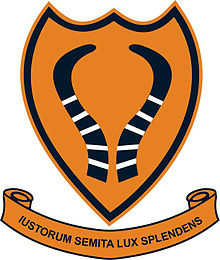Potchefstroom High School for Boys
| Potchefstroom High School for Boys | |
|---|---|
 |
|
| Location | |
|
Potchefstroom North-West 2531 South Africa |
|
| Information | |
| Type | British public school |
| Motto | Crest |
| Established | 1905 |
| Head of school | J. Van Vuuren |
| Staff | 36 (excluding faculty) |
| Grades | 6-12 |
| Gender | male |
| Number of students | 500 |
| Color(s) | Gold, Blue |
| Hostels | Barnard, Buxton, Granton, Milton |
| Sports | Rugby, Cricket, Hockey |
| Publications | The Mooi |
| Website | Link |
Potchefstroom High School for Boys is a high school situated in Potchefstroom, South Africa. It is one of the oldest schools in South Africa.
With the Transvaal under British control, Lord Milner, the Colonial Secretary at the time created educational facilities (known as the Milner Schools) for English-speaking pupils. The site for the school had been an infamous concentration camp during the 2nd South African War. The first school on the land was for the children interned in the camp. On 31 January 1905, accompanied by the band of the Border Regiment, Sir Richard Solomon, Lt-Governor of Transvaal opened Potchefstroom College upon instruction from the then Education Department, the school was renamed Potchefstroom High School for Boys. "College" is a boarding school based on the English boarding schools system. Founded by C.D. Hope (who was also the first principal of Pretoria Boys High School as well as Jeppe High School for Boys), the original structure had been built long before and had to close during the Anglo-Boer war. The school-building itself was designed in Cape Dutch architecture design as was prominent in style during those times which has since been declared a local heritage site. There are 3 boarding houses: Granton (Oxford Blue) (1909), Milton (Cambridge Blue) (1910) and Buxton (British Racing Green), which was constructed much later. The fourth house, Barnard (Royal Red) is the 'Day-Boy' house. These later buildings did not follow the traditional Cape Dutch styles and were built more suited to the period they were built in. The school's motto, Iustorum Semita Lux Splendens (Latin), was adapted by the founder C.D. Hope, from Proverbs 4:18, and means "The path of righteousness (alternately: the just) is (as) a shining light."
During the 1905 hunting season, just before the first Springbok team went on their rugby tour, the headmaster C.D. Hope was given the horns of a springbok by his brother-in-law. These horns, mounted, are in the school’s museum and a springbok head forms part of the school’s badge.
...
Wikipedia
